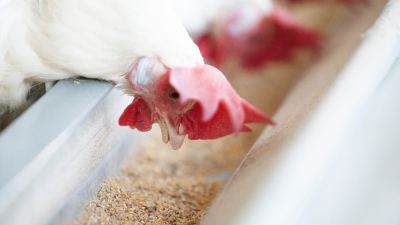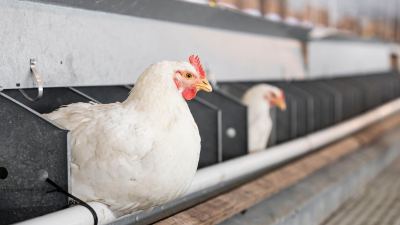Andrea Capitani - Adversity in Italy: Food production amid the crisis

The spread of COVID-19 has impacted the production and sale of milk more than other products in Italy.
As COVID-19 continues to impact communities around the world, the strength of the global food supply chain must be maintained. We spoke with Andrea Capitani, business manager for Alltech Italy, who shares how those working on the frontlines are overcoming adversity to provide food for families. What can we learn from one of the hardest-hit regions of the world?
This episode is part of a special AgFuture series on the impact of COVID-19 on the food supply chain. Join us to hear how those on the frontlines of the global pandemic are working to overcome adversity and feed the world.
The following is an edited transcript of Michelle Michael’s interview with Andrea Capitani. Click below to hear the full audio.
Michelle: Hello! I'm Michelle Michael. In this special series of AgFuture, we're talking with those working along the food supply chain about the impact of COVID-19. My guest today is Andrea Capitani, business manager for Alltech Italy. Andrea, you're in a really tough spot right now. The world is in a tough spot, but especially you, your friends, your family, your team in Italy. You're the hardest hit right now during this pandemic. Can you give us an update on how you're doing day-to-day — not from a business viewpoint, not from a work viewpoint, but personally? How are you holding up? What are you seeing today?
Andrea: Okay. Ciao, everybody. The story started a few weeks ago. It seems like years, but it's only a few weeks that we are completely shut down. We live our life in our house. Only a few people can travel, and for specific reasons. The rest of the people stay at home. Staying in the house with your family or with your loves or friends, whoever you live with, for days and days without leaving the house is quite challenging for everybody. We're so used to meeting with people, going to the restaurants, doing shopping, and now, those activities are completely gone. There's no social activity anymore. We can only speak with people through FaceTime or WhatsApp, videos in general. From an Italian perspective, we are more social than other cultures, and it is quite challenging, so this is how we live, and I don't know how long it will be.
Michelle: What are you feeling as you're, like me, just looking out the window? What are you feeling? How are you managing emotionally day-to-day?
Andrea: My suggestion, what I promised to myself and what I try to suggest to anybody: We need to stay busy. We need to keep our brain and the body — it depends on where you live — as busy as possible. If you start thinking or overthinking on what can happen, what could be, you become crazy. So, what we try to do — myself, my wife, my friends — we try to stay in contact and to keep our mental activity running as normal. We work through telephone or computer, of course, and we have social activities with those tools, so it keeps you busy as much as you can.
Michelle: In terms of agriculture there in Italy, how are farmers and producers holding up? What are they facing during these unprecedented times? It's probably changing daily.
Andrea: Yeah. There are two faces of the medal here: there is the reality and there is the reality that's shown from the industry. The reality is that farmers, they started to — the milk processors, the cheese producers — considering that restaurants are closed and we also cannot export anymore as we did in the past, the social life is not so social, so there are some goods, some foods, especially, that are completely forgotten — but for other foods, like fresh milk or meat, eggs, people still eat.
What farmers are facing is that they keep working as normal. The cheese and milk processors, for example, told them that they have to drop production as much as possible because they don't know what to do with the milk because the cheese is not sold. The mozzarella, Parmigiano-Regiano, whatever, is not sold as before, so they have to try to reduce the production without compromising the health of the cows or the animals in general because, sooner or later, it'll start back as normal, hopefully.
They are very stressed because they don't know what to do with the milk. The price of the milk dropped significantly, by 30% to 40%. In some cases, the mozzarella producers, the cheese factories, they didn't collect the milk, so the farmer has the milk in the farm and they don't know what to do with the milk, so they tried to freeze the milk, but you cannot freeze everything. For the other sectors, the eggs, they don't have any problem because people stay home and they normally cook, so they produce whatever they can in the house with the kids. The meat is the same. The sector of the agri-industry that is suffering much more at the moment here in Italy is the milk.
Michelle: We talked a little bit about the shutdown of restaurants and the social scene and the lack of a need for some items, and that's certainly affecting ag right now, but is it offset by an increase in grocery sales, for example?
Andrea: Yes, this is the fact. Statistics, you don't know if those are true or not, but I read recently that the groceries, the supermarkets, the big stores, they increased the sales of milk, eggs, flour, all the basic foods, significantly — by 50%, 60%, 80%. The consumption isn't that bad because people are still here and they have to eat. They don't go to the restaurants, but they eat at home.
What I think is making a difference is we have many tourists here during the year, especially now in the springtime, and I believe that a million tourists come here every year, so those guys aren’t here and those guys are not eating. This is why some foods are suffering more than others — for example, the wine. The wine is another sector that is suffering a lot because if you don't go to the restaurant, you normally don't drink a bottle of wine at home, or you don't buy many bottles. Also, the flours. The flours market is a niche market, but it's still an important business for us here in Italy. It's not for Alltech in general, but they cannot even sell the flours, so they stopped producing, and they don't know what to do with the flours. We're already in production. Some foods are okay. Some others are in big trouble.
Michelle: Andrea, focusing on the livestock, are some livestock sectors affected more than others at this time?
Andrea: Just the dairy cows and buffaloes. Those are the two sectors in livestock, in general, that are paying the bill. For the other species, there's no real difference between now and a few months ago. For eggs, for example, and poultry meat, broiler meat, it's even better now because the consumption grew a lot. Also, prices are linked to the growth. They are selling the eggs and the meat at a higher price, so they are quite happy, if we can say "happy" in this situation, but the milk is the one that is really a big problem.
Michelle: What about crop farmers? What hardships are they facing there in Italy right now?
Andrea: We are specialized; we don't produce row crops. We have, of course, but we are not a big country, so we don't produce tons and tons and tons of corn or wheat. We are more focused on importing those, and we produce more fruits and vegetables, especially in some regions of the south and even the north, but in the south, the temperature and the weather conditions are much better and they can grow crops all year long.
It seems that, also, this sector is going quite well, because people stay home and they try to eat as healthy as possible, so the consumption of any vegetable or any fruit has increased also. The challenge that all those guys have is that they cannot be in contact with other people. They need to pay attention. They have to use the masks. (Maintaining) a normal life isn't easy for them, but in terms of business, the crop guys, fruits and vegetables, at the moment, are doing quite well.
There are some crops that are probably going to have an impact on those. I'm thinking about the summer crops, like cherries or table grapes, but I don't think — because we export a lot of those, also, to Germany, Austria, Switzerland, and, at the moment, we cannot export, or the export is not so relevant, so if things don't change, maybe those guys will be affected too, but to this date, in March, the crop guys are quite happy.
Michelle: It seems all around the world, daily — sometimes hourly — we hear of new rules and restrictions on our lives. We have to do things differently than we did them one month ago or two months ago. What are farmers or businesses doing there in Italy to adapt, really, to this fast-changing world?
Andrea: As I said, you can leave your house for three reasons: one, for buying food and medicines; two, to go to work; and three, for specific and serious reasons, whatever they are. There's the police industry that can stop you, and you have to have a paper with you. It's a form that you have to fill out and give to the police guy, and this guy can say, “Okay, you can go” or “You go home.” They can also give you a fine and bring you to jail, in some cases, of course. It's just a simple thing, but this form has changed four or five times in the last ten days, so we don't even know which one is the right one because they keep changing.
The farmers, consumers, anybody, myself — it's not that easy to operate, because you cannot leave the house, for one. Two, you cannot meet with people, and you have to stay at least a meter from them, and you have to put on your gloves, plastic gloves, the mask, and even more if you work in some areas. You'll never know who the person that you're across from is. Is he good? Is he infected? We don't know. So, the social activity, in general, and the operational activity of any business is really struggling with the new rules, and again, they keep changing. We had the red zone, which was a completely closed zone in the north. They enlarged and enlarged and, now, Italy is the red zone. Then it's not red, but it's super red. It's a very chaotic approach, and I hope that you in America or in the other countries are learning from us. It's better to stop everything for a while and wait, as Spain did, to wait and hope that things won't happen, because when things start to happen, it is too late.
I don't know if that's the answer to your question, but it's a very complicated environment where we live in, and there's a new set of rules that is announced, as you said, every day. It's easy, in some ways, to — if I need to stay home, I don't care. The only people who care about the new rules and all the other things are the ones that — like my wife, for example: she works (outside of the home), and she has to accomplish all the new rules that are set every day or week.
Michelle: The world looks to Italy right now. I'm curious if there are lessons that you're learning right now about how agriculture and the food supply works. What does that future look like?
Andrea: I was in a call before with a friend that produced feed. They also produced some feeds for us, and he told me he's really, really scared about the new future, the close future, because (as he said), “I don't know what and how and when we'll pass this phase and when we'll start again.” If there's a lesson that we need to learn, we waste hours and hours of our time every year doing things that are not so necessary, in general, in life, and also in our business. The efficiency is not that efficient. I think that we'll start, hopefully, to increase the local consumption more than importing too many things from everywhere. Consumers, in my opinion, will go back to — my relatives, my grandmother, they got only what the season allowed them to get in terms of fruits and vegetables and also the meat. You eat the meat, but you don't need to eat the meat from Argentina. We are in Italy and we eat Italian meat. You're in America and you — I know that export is a very important thing for any country, but I think that the consumers are realizing that probably it's better to — there's a lack of consumption of what you produce instead of importing exotic things.
The other thing is I think that people will travel less, at least for the next years, because, probably, we've traveled too much, and in some occasions, the travel wasn't so necessary. This is what I think. I'm not a scientist. I'm not a genius. That's just my opinion. Speaking with people here, we are enjoying the time differently, and we recognize that a lot of our time is spent on other things that are not so important. I think that for the food, it'll be the same. The agribusiness will be the same.
Michelle: There are so many stories right now of struggles, sacrifices, and we hear things going on — the hardships, really — but in the middle of all that, there are also stories of great human compassion. What heartwarming stories are you hearing out of Italy even during these really, really difficult times?
Andrea: The first thing is there are many people that are sacrificing their lives for other people. I'm speaking about the doctors and all the people who work in the hospitals — also, the industries in general, factories and the farmers, as in our case. They try to find ways, of course, to sell their product, because we need to sell something to survive, but also to sell it in a way that can have an impact on other people.
Consider, for example, the mozzarella di bufala farmers at the moment. They don't know what to do with the milk. Why should they dump the milk, especially when they have their own cheese factory? This sector is quite common, so you have the buffalo farm and then you have your own mozzarella di bufala cheese factory, and you sell it directly to consumers or to restaurants and so on. In our case, we have a group of farmers (who are) our friends. They have been in Kentucky several times, so they are farmers, but they are quite progressive farmers. They said, "We have to destroy the milk anyway. I'm not going to dump it. I'm going to produce some cheeses and I'm going to give those cheeses to the local hospitals so that at least they can have some food to eat" — the doctors, of course, not the people that are sick.
Also, when they sell the mozzarella, let's say the mozzarella price is €10 per kilo. They give €3 of the €10 to the local hospital to buy the medical equipments and all the other things that are necessary, whatever they are. So, you can just accept the disaster, or you can try to adopt the disaster to be positive. There are many, many stories like this, especially in the dairy sector, but we also have customers that are donating money, or they are trying to supply crops, zucchini or whatever, to the hospitals or to the places where they need it, because if you cannot sell it and you have to destroy it, it's better, in a moment like this, that you share what you have with other people. In some ways, we see a lot of kind approaches to the other person, and I hope that this is another lesson that we learn that won't disappear after the coronavirus.
Michelle: That would lead right into my next question. You hear these stories of neighbors helping neighbors, strangers helping strangers. It's one of the positives, if there is such a thing, in a pandemic. What's one takeaway that you have after seeing COVID-19 firsthand change the very world around you? How will it change you? How will it change the way you behave on a daily basis?
Andrea: I want to keep in mind that we only have 24 hours a day and those are the only hours that we have and to use those as best as possible, avoiding useless waste of time or focusing on things that are not so important. I'm spending a lot of time with my daughters, and I'm not used to it because I'm always traveling. I'm appreciating the time spent with them and, also, staying at home, which is another thing that is not normal for me. I think that my personal takeaway is I will use my time better.
Michelle: Andrea Capitani, business manager for Alltech Italy, thank you for joining us today. It's really good to hear your voice.
Andrea: Thank you so much.
Michelle: For additional resources on COVID-19, visit Alltech.com.















